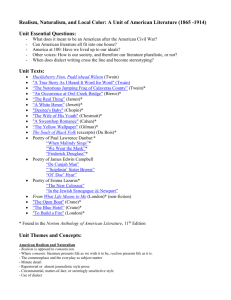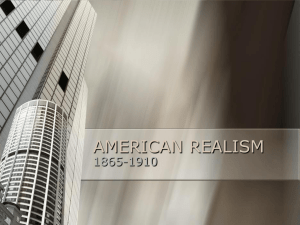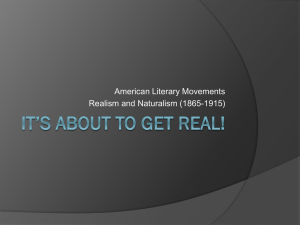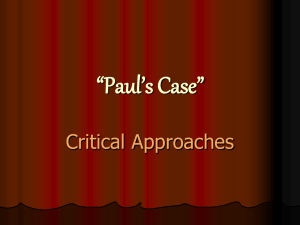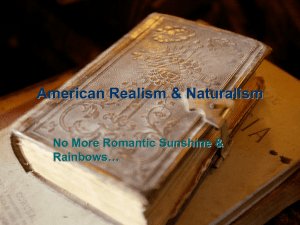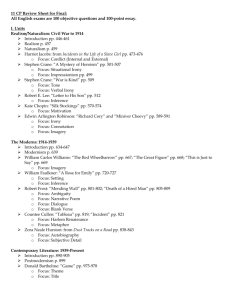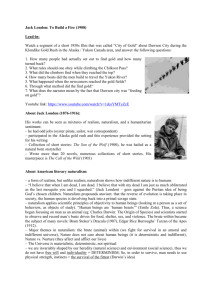Naturalism - reitzmemorial.org
advertisement
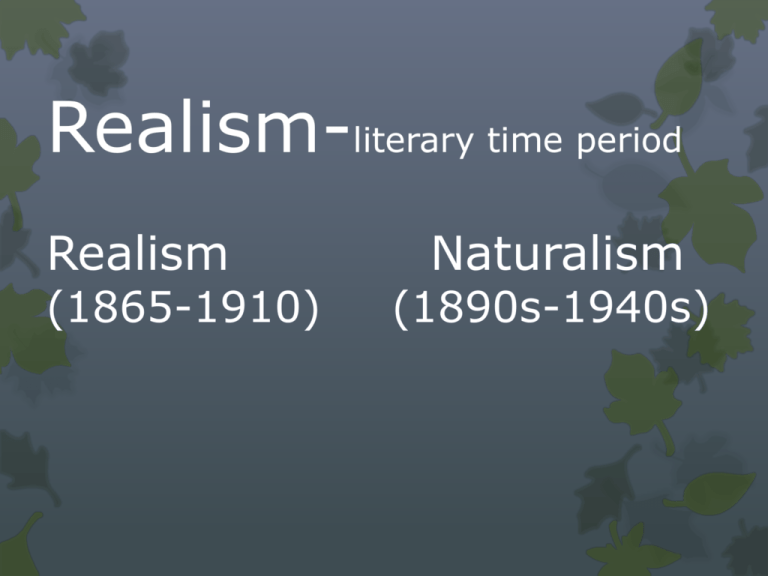
Realism-literary time period Realism (1865-1910) Naturalism (1890s-1940s) Realism -literary movement (1865-1910) Origins Developed in France in the mid 19th c. Spread to England, Russia, and U.S. Counter-movement to Romanticism Realist writers: Kate Chopin, Mark Twain, and Willa Cather Characteristics of Realism Realists sought to render common people and ordinary life accurately in literature and in art. Focus on complex characters who are ordinary people, not heroes or villains. Attempted to present life objectively and honestly without being sentimental or idealistic. Use of detached narration Focuses on the sharp contrasts in society. “Captains of industry” vs. immigrants and laborers. Characteristics of Realism Depicts true-to-life dialogue that captures the dialects nuances of speech. Portrays ordinary settings and settings that reflect society and culture. Most settings are described in great detail. Literary realism seeks to explore the key social issues of the time. Made careful observations of life. People-working class Social issues-social class and negatives of the Industrial Revolution. Urbanization, massive immigration, The Dust Bowl, The Great Depression Naturalism (1890’s-1940’s) Origins Originated in France in the late 1800s Branched off of Realism Strongly influenced by Charles Darwin’s ideas Naturalist writers: Dreiser, Frank Norris, Jack London, and Stephen Crane. Characteristics of Naturalism Like Realists, Naturalists sought to render common people and ordinary life accurately in literature and in art. Naturalists focused on the harsh realties of the world. Pessimistic tone Naturalists overemphasized how instinct and environment affect human behavior. Naturalists favored characters in the lower class, or characters with “taboo” careers or characteristics. Characteristics of Naturalism Determinism Belief that the fate of man is determined by forces beyond an individual’s control Some questions a naturalist writer might ask: What motivates people to do the things they do? Is life a losing battle? Are we helpless against forces beyond our understanding and control? (Fate or nature) Structure within Realist and Naturalist Literature Lacks poetic features Simplified language Repetition of key phrases, settings, and/or ideas. Simple plot Conflict. Primarily Man vs. Nature or Man vs. Society. These often lead to Man vs. Self A man said to the universe: “Sir, I exist!” “However,” replied the universe, “That fact has not created in me a sense of obligation.” -Stephen Crane 3 Differences Between Realism and Naturalism: 1) Realism sought to be an accurate representation of life, while Naturalism is more like a "chronicle of despair”. 2) While in Realism the main focus is on the working class and its problems, Naturalism favors the lower class and outcasts of society for its characters and taboo. 3) In Realism, settings can be described in great detail, but are described accurately and realistically. In Naturalism, Nature itself is portrayed as an indifferent, relentless, and overpowering force.

